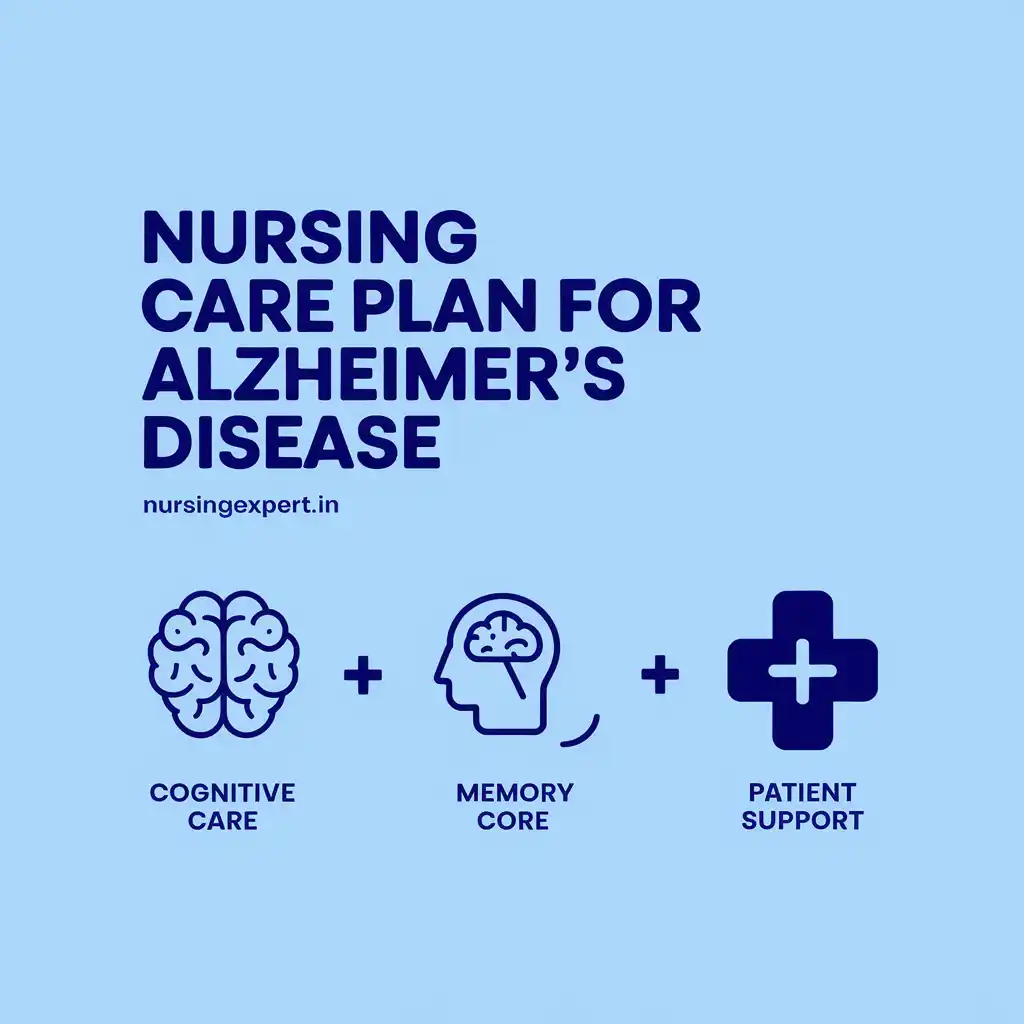1. Introduction
Alzheimer’s disease affects memory, thinking, and behavior. Nurses play a key role in caring for patients and their families at every stage of this progressive illness. This guide offers a clear, step-by-step plan to assess, manage, and educate those affected by Alzheimer’s disease.
Thank you for reading this post, don't forget to subscribe!
2. Understanding Alzheimer’s Disease
Alzheimer’s disease is the most common form of dementia. It starts with minor memory lapses and may progress to severe cognitive decline. Nurses help patients cope with both physical challenges and emotional changes as the disease advances.


3. Pathophysiology of Alzheimer’s Disease
The brain in Alzheimer’s disease shows two key changes:
- Amyloid Plaques: Clusters of misfolded proteins accumulate between brain cells.
- Tau Tangles: Abnormal tau proteins form tangles inside the cells.
These changes disrupt communication between neurons and eventually lead to cell death, affecting memory and daily functioning.
4. Etiology of Alzheimer’s Disease
Several factors increase the risk of developing Alzheimer’s:
- Genetics: A family history and specific genetic mutations (such as the APOE-e4 allele) can raise the risk.
- Age: The likelihood of developing Alzheimer’s increases as people get older.
- Lifestyle and Environment: Poor heart health, low education levels, and a sedentary lifestyle may contribute.
- Other Health Conditions: Diseases like diabetes, high blood pressure, and high cholesterol are linked to a higher risk.
Understanding these factors helps nurses create personalized care plans that focus on prevention and support.
5. Signs and Symptoms
Patients with Alzheimer’s disease may show:
- Memory Loss: Difficulty recalling recent events or familiar information.
- Cognitive Decline: Problems with decision-making, language, and problem-solving.
- Behavioral Changes: Increased anxiety, agitation, or depression.
- Disorientation: Confusion about time, place, or the people around them.
- Daily Challenges: Trouble performing routine tasks like dressing or eating.
Recognizing these signs early allows nurses to begin supportive interventions promptly.
6. Nursing Diagnoses
Using established guidelines, common nursing diagnoses for Alzheimer’s disease include:
- Impaired Memory: Related to brain degeneration, shown by forgetfulness and disorientation.
- Risk for Injury: Due to impaired judgment and confusion.
- Ineffective Communication: Resulting from declining cognitive abilities.
- Chronic Confusion: Ongoing cognitive impairment.
- Deficient Knowledge: About disease management and coping strategies.
- Anxiety: Linked to changes in memory and fear of progression.
These diagnoses help direct focused and effective care.
7. Nursing Interventions
Nursing interventions for Alzheimer’s disease are designed to improve patient safety, support cognitive function, and ease emotional distress. Key interventions include:
- Cognitive Assessments:
Regularly check memory, orientation, and communication skills using standard tools.
Rationale: Ongoing assessments help adjust care plans as the patient’s needs change. - Enhancing Safety:
Remove hazards, use identification bracelets, and create a consistent environment.
Rationale: A safe space reduces the risk of injury due to disorientation. - Effective Communication:
Use simple language, visual aids, and allow extra time for responses.
Rationale: Clear communication helps reduce frustration and promotes understanding. - Structured Routines:
Establish regular daily schedules for meals, activities, and rest.
Rationale: Consistent routines support orientation and independence. - Behavioral Management:
Offer reassurance, use redirection techniques, and consider professional counseling if needed.
Rationale: Addressing behavioral symptoms improves overall well-being. - Nutritional Support:
Work with dietitians to create a balanced diet plan.
Rationale: Good nutrition is vital for energy and brain function. - Medication Administration:
Ensure the patient takes medications as prescribed, including cholinesterase inhibitors or memantine.
Rationale: Medications may slow disease progression and control symptoms.
8. Nursing Management Strategies
A successful care plan begins with a complete assessment of the patient’s physical, cognitive, and emotional status. Nurses should:
- Conduct regular evaluations.
- Adjust the care plan as the patient’s condition changes.
- Involve an interdisciplinary team, including neurologists, therapists, dietitians, speech-language pathologists, mental health professionals, and social workers.
This team approach ensures all aspects of the patient’s needs are met.
9. Patient and Family Education
Educating patients and families is crucial. Nurses should:
- Explain how Alzheimer’s disease affects memory and behavior.
- Teach safety measures to reduce injury risk.
- Offer simple communication strategies.
- Stress the importance of following medication schedules.
- Encourage daily routines and cognitive exercises.
- Provide information about counseling and support groups.
Knowledge empowers patients and families, helping them manage daily challenges and maintain quality of life.
10. Interdisciplinary Collaboration
Effective care for Alzheimer’s patients requires a team approach. Collaboration among specialists ensures that:
- Neurologists monitor disease progression.
- Occupational and Physical Therapists help maintain mobility and independence.
- Dietitians create nutritional plans.
- Speech-Language Pathologists assist with communication.
- Mental Health Professionals address emotional issues.
- Social Workers connect families with community resources.
This combined effort results in comprehensive care that adapts to the patient’s evolving needs.
11. Sample Nursing Care Plan for Alzheimer Disease
Below is a sample format for a nursing care plan that guides daily practice:
| Assessment | Nursing Diagnosis | Goal/Expected Outcome | Intervention/Planning | Implementation | Rationale | Evaluation |
|---|---|---|---|---|---|---|
| Memory and Orientation Issues Patient struggles to recall recent events. | Impaired Memory due to neurodegeneration. | Short-Term: Patient will show improved orientation with cues within 24 hours. Long-Term: Patient will maintain functional memory with support. | Use memory aids (calendars, labeled items) and provide frequent orientation cues. | Introduce visual prompts and a daily routine; monitor improvements during interactions. | Consistent routines and memory aids support cognitive function. | Improved orientation observed; family notices better recall. |
| Anxiety Signs Patient expresses fear about memory loss. | Anxiety related to fear of disease progression. | Short-Term: Patient will report reduced anxiety within 24 hours using relaxation techniques. Long-Term: Patient will manage anxiety using coping strategies. | Provide emotional support and teach relaxation techniques such as deep breathing. | Offer one-on-one sessions and distribute relaxation exercises; monitor physical signs like heart rate. | Reducing anxiety can improve overall well-being. | Patient reports lower anxiety levels; physiological measures show improvement. |
| Self-Care Uncertainty Patient asks questions about medication routines. | Deficient Knowledge regarding Alzheimer’s management. | Short-Term: Patient will verbalize key self-care and medication practices within 24 hours. Long-Term: Patient will consistently follow the care plan. | Develop an education plan with clear, written instructions and visual aids. | Conduct individual teaching sessions and provide brochures; review regularly. | Education improves patient self-management and care adherence. | Patient demonstrates better self-care; follow-up shows improved understanding. |
12. Downloadable Nursing Care Plan PDF
A complete PDF version of this nursing care plan is available for download. This resource provides detailed, step-by-step instructions and can serve as a reference for clinical practice or exam review.
📥 Download the Nursing Care Plan for Alzheimer’s Disease PDF
13. Frequently Asked Questions (FAQs)
Q1: What is Alzheimer’s disease?
A1: Alzheimer’s disease is a progressive condition that causes memory loss, confusion, and changes in behavior.
Q2: What are the early signs of Alzheimer’s?
A2: Early signs include difficulty remembering recent events, confusion about time and place, and trouble with routine tasks.
Q3: Which nursing interventions are most effective?
A3: Regular cognitive assessments, safety measures, clear communication, structured routines, and patient education are key interventions.
Q4: How do medications help manage Alzheimer’s?
A4: Medications such as cholinesterase inhibitors and memantine can help slow the disease progression and manage symptoms.
Q5: How can families support a loved one with Alzheimer’s?
A5: Families can support by learning about the disease, creating a safe environment, participating in daily routines, and using effective communication strategies.
14. Conclusion
A clear nursing care plan is essential to support patients with Alzheimer’s disease. By using structured assessments, targeted interventions, and thorough patient education, nurses can improve the quality of life for both patients and their families. Working closely with an interdisciplinary team ensures that care remains holistic and adaptive to the patient’s needs.
15. References
- Mayo Clinic. (2023). Alzheimer’s Disease: Overview and Treatment. Retrieved from https://www.mayoclinic.org/diseases-conditions/alzheimers-disease
- MedlinePlus. (2023). Alzheimer’s Disease. Retrieved from https://medlineplus.gov/alzheimersdisease.html
- NANDA International. (2022). NANDA Nursing Diagnoses: Definitions and Classifications. Retrieved from https://www.nanda.org/
- Alzheimer’s Association. (2023). Understanding Alzheimer’s Disease. Retrieved from https://www.alz.org
- Centers for Disease Control and Prevention (CDC). (2023). Dementia: Facts and Statistics. Retrieved from https://www.cdc.gov/aging/dementia/index.html


